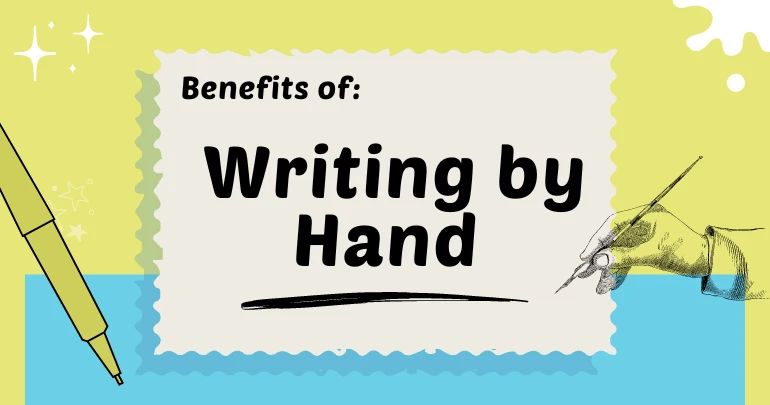What does "writing with hand means"?
"Writing with hand" refers to the act of physically forming letters, words, or symbols using a pen, pencil, or other writing instrument on a surface such as physical paper, whiteboard or a digital writing pad, as opposed to using a keyboard or touchscreen device. It involves the manual manipulation of the writing instrument to create written text through the coordination of fine motor skills and cognitive processes.
Writing by Hand Leads To Better Brain Connectivity
At its core, writing by hand engages multiple regions of the brain, fostering intricate neural connections that facilitate learning, memory retention, and cognitive processing. Unlike typing, which primarily involves repetitive finger movements, handwriting activates various sensory-motor pathways, including those responsible for proprioception—the sense of the body's position in space—and kinesthesia—the perception of bodily movements. As a result, the act of forming letters and words by hand stimulates neural networks associated with spatial awareness, motor control, and tactile feedback.
Furthermore, the deliberate and deliberate nature of handwriting requires active engagement of cognitive processes such as attention, planning, and problem-solving. When individuals write by hand, they must mentally translate their thoughts into motor commands to produce legible letters and words, thereby promoting the integration of language and motor skills within the brain's neural circuitry. This intricate interplay between cognition and motor function fosters a deeper level of processing compared to typing, which often involves automatic and less cognitively demanding movements.
Writing By Hand vs. Typing: What Research Says
Well, research indicates that the tactile feedback provided by pen and paper enhances memory encoding and retrieval processes. Studies have shown that individuals who take notes by hand demonstrate better comprehension and retention of information compared to those who type their notes. This phenomenon, known as the "generation effect," suggests that the physical act of writing reinforces memory traces by engaging multiple sensory modalities, including touch, vision, and proprioception. By actively shaping letters and forming words, individuals create stronger associations between the written content and their own cognitive processes, leading to more robust memory consolidation.
"Only when students were writing given words by hand with a digital pen on a touchscreen, did we find widespread brain connectivity in large parts of the brain," says Audrey van der Meer, study co-author and rain researcher and Professor of Neuropsychology at the Norwegian University of Science and Technology (NTNU) in Trondheim, Norway. "When they typed on a keyboard, on the other hand, the brain was much less active, and as a result, there was no need for the brain to communicate between its active parts, resulting in little to no neural connections."
Beyond its cognitive benefits, writing by hand also fosters creativity and self-expression. The fluidity and versatility of pen and paper allow individuals to sketch ideas, jot down thoughts, and explore concepts in a way that typing often cannot replicate. The tactile experience of writing by hand promotes a deeper sense of engagement with the material, enabling individuals to unleash their creativity and express themselves more authentically.
The Write Way: Superiority of Handwriting Over Typing
- Enhanced neural connectivity – Writing by hand engages multiple sensory-motor pathways, promoting intricate neural connections and fostering deeper cognitive processing compared to typing.
- Improved memory retention – The tactile feedback provided by pen and paper enhances memory encoding and retrieval processes, leading to better comprehension and retention of information.
- Active cognitive engagement – Handwriting requires active engagement of cognitive processes such as attention, planning, and problem-solving, leading to more robust learning outcomes compared to typing.
- Facilitates creativity and self-expression – The fluidity and versatility of pen and paper allow for more spontaneous ideation and exploration, fostering creativity and authentic self-expression.
- Promotes fine motor skills – Writing by hand strengthens fine motor skills and hand-eye coordination, contributing to overall dexterity and manual proficiency.
The act of writing by hand offers far-reaching cognitive benefits that extend beyond mere penmanship. By engaging multiple sensory-motor pathways and promoting active cognitive processing, handwriting enhances brain connectivity and fosters a deeper understanding of information. As we navigate an increasingly digital landscape, preserving and prioritizing the practice of handwriting is essential for nurturing cognitive development, enhancing learning outcomes, and promoting creative expression. So, next time you reach for your keyboard, consider picking up a pen instead—you might just be giving your brain a workout it truly deserves.
